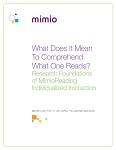
Reading this on a mobile device? Try our optimized mobile version here: http://r.smartbrief.com/resp/eagKCduTtWCfeqkdCidncVCicNGsOd
   | | | Head of the Class |  | | |  | - Why Wikipedia could have a place in the classroom
 While some educators have rejected the use of Wikipedia in an academic setting, there are occasions when it makes sense to use the user-generated content on the site, writes Rhett Allain, an associate professor of physics at Southeastern Louisiana University. He writes in this blog post that the content on the website has become more reliable over the years, and if the goal is for students "to process and synthesize information" it makes sense for Wikipedia to be used. Wired.com/Wired Science blog (11/17) While some educators have rejected the use of Wikipedia in an academic setting, there are occasions when it makes sense to use the user-generated content on the site, writes Rhett Allain, an associate professor of physics at Southeastern Louisiana University. He writes in this blog post that the content on the website has become more reliable over the years, and if the goal is for students "to process and synthesize information" it makes sense for Wikipedia to be used. Wired.com/Wired Science blog (11/17)        |  | What Does it Mean to Comprehend What One Reads?
When students understand what they read, they are applying a constellation of skills and strategies to interpret the text based on both the features of the text and their own knowledge. In this paper we discuss the building blocks of teaching reading comprehension. Download the Free Whitepaper | |
|  | - Students, teachers in Mo. cite benefits of Wi-Fi access in class
A program in which middle- and high-school students who bring their own Wi-Fi-enabled devices to school and given Internet access has been successful, according to educators at two schools in Missouri that implemented the pilot program. Now, the district plans to expand the program, but will not require students to bring their own devices. Students, so far, have used their devices to take notes in class and look up information online. St. Louis Post-Dispatch (11/19)       - Cost-effectiveness is among benefits of BYOD programs
For colleges without room in their budgets to provide mobile devices for their students, bring-your-own-device programs offer a cost-effective option. Cost -- and students' familiarity with the devices -- are among the benefits of such programs. Negatives, however, include differences in students' access to such devices, as well as in operating systems and IT service levels. CampusTechnology.com (11/14)       - High-school students increasingly exercise caution online
With more than 25% of 350 school officials recently surveyed saying they consult Facebook or Google when considering college applications, a growing number of high-school students are taking measures to ensure their profiles don't sabotage their chances. Some high-school students are even deleting their Facebook profiles ahead of applying to college. Others say they have changed their privacy settings to better protect themselves from scrutiny. Time.com (11/15)        | |  | - Will cyberbullying cause UK teachers to quit?
In the United Kingdom, the head teachers' union says that cyberbullying is having an increasing effect on teachers, especially attacks by parents. Eventually, one head teacher said, teachers will leave the profession if the attacks persist. "Teachers, like most adults, do understand the difference between comments and fair criticism, and you know we're happy to deal with those type of complaints from parents, but protracted campaigns of abuse is not something I think we should be expected to ignore," Bernadette Hunter, of the union, said. BBC (11/15)        | Nothing is too small to know, and nothing is too big to attempt."
--William Cornelius Van Horne,
Canadian railway executive       |
|
| SmartBrief delivers need-to-know news in over 100 targeted email newsletters to over 3 million readers. All our industry briefings are FREE and open to everyone—sign up today! | | |
| This SmartBrief was created for jmabs1@gmail.com |
| Advertise | | Publisher, Education Group: Joe Riddle 202-407-7857 | | | | | | | | | | Recent SmartBrief on EdTech Issues: - Friday, November 16, 2012
- Thursday, November 15, 2012
- Wednesday, November 14, 2012
- Tuesday, November 13, 2012
- Monday, November 12, 2012
| | | Lead Editor: Katharine Haber
Contributing Editor: Erin Cunningham
Mailing Address:
SmartBrief, Inc.®, 555 11th ST NW, Suite 600, Washington, DC 20004 | | | | | | © 1999-2012 SmartBrief, Inc.® Legal Information | |




No comments:
Post a Comment